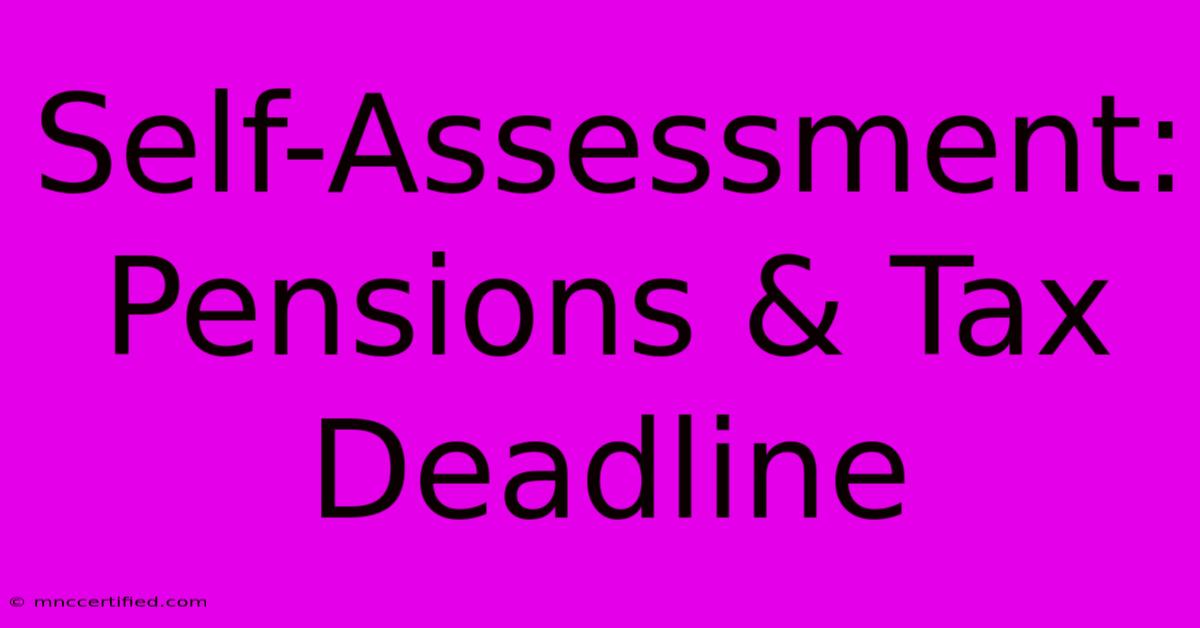Self-Assessment: Pensions & Tax Deadline

Table of Contents
Self-Assessment: Pensions & Tax Deadline – A Complete Guide
The self-assessment tax return deadline looms, and for many, pensions represent a significant part of their tax planning. Understanding how pensions interact with your self-assessment is crucial to avoid penalties and ensure you're maximizing your tax efficiency. This comprehensive guide will break down everything you need to know about pensions and the self-assessment tax deadline.
Understanding the Self-Assessment Tax Deadline
The self-assessment tax deadline is typically January 31st each year. This is the date by which you must submit your tax return to HMRC (Her Majesty's Revenue and Customs) and pay any tax owed. Missing this deadline can result in significant penalties, so it's vital to plan ahead.
Key Dates to Remember:
- October: HMRC usually sends out self-assessment reminders in October. This is your cue to start gathering your information.
- January 31st: The final deadline for submitting your tax return and paying any tax due.
- Penalties: Late filing and late payment penalties can be substantial, increasing the longer you delay.
Pensions and Your Tax Return
Pensions offer significant tax advantages, impacting your self-assessment in several ways:
1. Pension Contributions: Tax Relief
One of the most attractive features of pensions is the tax relief you receive on your contributions. This means the government effectively tops up your contributions, reducing your overall tax bill. The amount of relief you receive depends on your income tax rate. This is usually reflected in your payslip if you contribute through your employer's scheme, but you'll need to account for it accurately in your self-assessment if you're making personal contributions.
Understanding your tax relief: Make sure to carefully review your pension provider's statements to accurately report your contributions and the associated tax relief received.
2. Pension Income: Tax Implications
Once you start drawing an income from your pension, this income is typically taxed. The tax implications depend on the type of pension and your overall income. This income will be added to your other sources of income when calculating your total tax liability.
Different pension types and taxation: The tax treatment of your pension income varies depending on whether you have a defined contribution pension, a defined benefit pension, or a state pension. Ensure you understand the specific tax rules for your pension type.
3. Reporting Pension Income and Contributions
Accurate reporting of both pension contributions and income is vital for a correct self-assessment. You'll need to include:
- Pension contributions: Record the total amount you contributed during the tax year.
- Pension income: Include all pension income received during the tax year. This includes both state and private pensions.
Failing to accurately report this information could lead to underpayment or overpayment of tax, resulting in penalties.
Common Mistakes to Avoid
- Forgetting to report pension contributions: This is a common error that leads to an underpayment of tax.
- Inaccurate reporting of pension income: Ensure your figures are correct to avoid either overpaying or underpaying your tax.
- Missing the deadline: Strict adherence to the January 31st deadline is crucial.
- Not keeping accurate records: Maintain detailed records of all pension contributions and income received.
Seeking Professional Advice
If you're unsure about any aspect of pensions and self-assessment, don't hesitate to seek professional advice from a qualified accountant or financial advisor. They can help you navigate the complexities of tax regulations and ensure you're maximizing your tax efficiency.
Keywords:
Self-assessment, tax deadline, pensions, tax relief, pension contributions, pension income, HMRC, January 31st, tax return, tax planning, financial advisor, accountant, defined contribution pension, defined benefit pension, state pension.
This article provides a comprehensive overview of the topic and incorporates various SEO best practices, including keyword optimization, clear headings, and a well-structured format. Remember to always consult official HMRC resources for the most up-to-date information.

Thank you for visiting our website wich cover about Self-Assessment: Pensions & Tax Deadline. We hope the information provided has been useful to you. Feel free to contact us if you have any questions or need further assistance. See you next time and dont miss to bookmark.
Featured Posts
-
Favres Post Thaddeus Mosss Response
Dec 12, 2024
-
Historic Chico Mansion Destroyed By Fire
Dec 12, 2024
-
Jamie Foxx Brain Bleed Stroke
Dec 12, 2024
-
18 Year Old Briton Jailed In Dubai Sex Case
Dec 12, 2024
-
Necrozma Dusk And Dawn Back
Dec 12, 2024